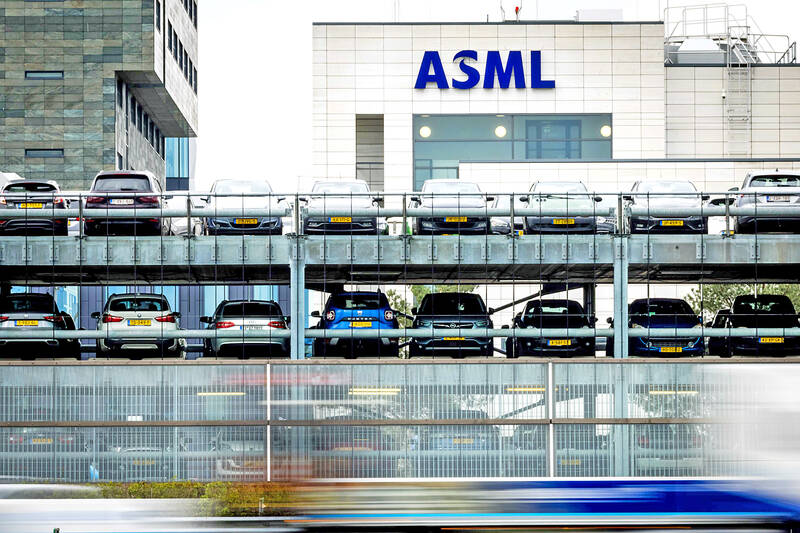US President Joe Biden’s administration plans to press the Netherlands next week to stop its top chipmaking equipment maker, ASML Holding NV, from servicing some tools in China, two people familiar with the matter said.
US Undersecretary of Commerce for Industry and Security Alan Estevez is scheduled to meet in the Netherlands on Monday with officials from the Dutch government and ASML to discuss the servicing contracts, the people said.
Washington might also be seeking to add to a list of Chinese chipmaking factories restricted from receiving Dutch equipment as part of the discussions, one of the people said.

Photo: EPA-EFE
The Dutch Ministry of Foreign Affairs confirmed the upcoming meeting, but did not elaborate on which topics would be on the agenda.
“The Netherlands always has good discussions with our partners. The meeting of officials on Monday is one example of that,” the ministry said.
The Chinese Embassy in Washington said that Beijing opposes the US’ “overstretching” of the concept of national security and use of “pretexts to coerce other countries into joining its technological blockade against China.”
The US Department of Commerce and ASML, whose shares briefly fell after the news, declined to comment.
The meeting is Washington’s latest move to convince allies to join US efforts to further crack down on Beijing’s ability to produce cutting-edge chips.
Last year, sanctioned Chinese telecoms giant Huawei Technologies Co (華為) shocked the world with a new phone powered by a sophisticated chip. The Huawei Mate 60 Pro was seen as a symbol of China’s technological resurgence despite Washington’s ongoing efforts to cripple its capacity to produce advanced semiconductors.
Chip-related exports to China are vital for its economy.
Chinese President Xi Jinping (習近平) this week complained to Biden about US efforts to block some US technologies, including advanced semiconductors, saying it hindered China’s development.
Restrictions on servicing ASML machines could be particularly painful given that the large and expensive tools require constant maintenance.
China was ASML’s second-largest market by sales last year (29 percent), after Taiwan.
Last year, Japan and the Netherlands joined a US effort to keep some chipmaking technology from China for national security reasons.
The Dutch government began restricting some deep ultraviolet equipment for Chinese customers and partially revoked one license, affecting a small number of customers in China, ASML said.
However, the Dutch restrictions did not go as far as US rules, which barred American firms from servicing equipment at advanced Chinese factories.
Estevez has said publicly that the US is asking allies to stop local companies from servicing some chipmaking tools for Chinese customers.

SEMICONDUCTORS: The German laser and plasma generator company will expand its local services as its specialized offerings support Taiwan’s semiconductor industries Trumpf SE + Co KG, a global leader in supplying laser technology and plasma generators used in chip production, is expanding its investments in Taiwan in an effort to deeply integrate into the global semiconductor supply chain in the pursuit of growth. The company, headquartered in Ditzingen, Germany, has invested significantly in a newly inaugurated regional technical center for plasma generators in Taoyuan, its latest expansion in Taiwan after being engaged in various industries for more than 25 years. The center, the first of its kind Trumpf built outside Germany, aims to serve customers from Taiwan, Japan, Southeast Asia and South Korea,

POWERING UP: PSUs for AI servers made up about 50% of Delta’s total server PSU revenue during the first three quarters of last year, the company said Power supply and electronic components maker Delta Electronics Inc (台達電) reported record-high revenue of NT$161.61 billion (US$5.11 billion) for last quarter and said it remains positive about this quarter. Last quarter’s figure was up 7.6 percent from the previous quarter and 41.51 percent higher than a year earlier, and largely in line with Yuanta Securities Investment Consulting Co’s (元大投顧) forecast of NT$160 billion. Delta’s annual revenue last year rose 31.76 percent year-on-year to NT$554.89 billion, also a record high for the company. Its strong performance reflected continued demand for high-performance power solutions and advanced liquid-cooling products used in artificial intelligence (AI) data centers,

Gasoline and diesel prices at domestic fuel stations are to fall NT$0.2 per liter this week, down for a second consecutive week, CPC Corp, Taiwan (台灣中油) and Formosa Petrochemical Corp (台塑石化) announced yesterday. Effective today, gasoline prices at CPC and Formosa stations are to drop to NT$26.4, NT$27.9 and NT$29.9 per liter for 92, 95 and 98-octane unleaded gasoline respectively, the companies said in separate statements. The price of premium diesel is to fall to NT$24.8 per liter at CPC stations and NT$24.6 at Formosa pumps, they said. The price adjustments came even as international crude oil prices rose last week, as traders

SIZE MATTERS: TSMC started phasing out 8-inch wafer production last year, while Samsung is more aggressively retiring 8-inch capacity, TrendForce said Chipmakers are expected to raise prices of 8-inch wafers by up to 20 percent this year on concern over supply constraints as major contract chipmakers Taiwan Semiconductor Manufacturing Co (TSMC, 台積電) and Samsung Electronics Co gradually retire less advanced wafer capacity, TrendForce Corp (集邦科技) said yesterday. It is the first significant across-the-board price hike since a global semiconductor correction in 2023, the Taipei-based market researcher said in a report. Global 8-inch wafer capacity slid 0.3 percent year-on-year last year, although 8-inch wafer prices still hovered at relatively stable levels throughout the year, TrendForce said. The downward trend is expected to continue this year,